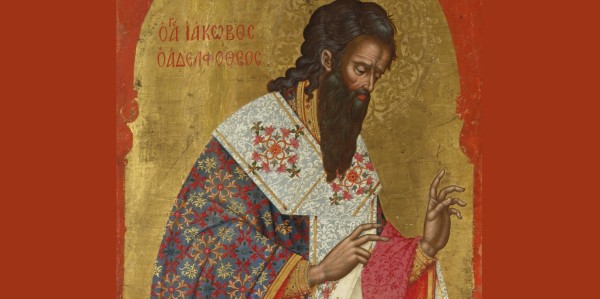|
Detail of St. James the Brother of the Lord by Tzangarolas Stephanos, 1688, via Wikimedia Commons The Gospel of Matthew informs us that “A prophet is not without honor except in his own country and in his own house.” Ah yes, the old familiarity breeds contempt idea. People familiar with Jesus’ household fail to perceive God’s presence in him simply because they know his family origin and context. He is Joe and Mary’s boy. They know his brothers and sisters. His expressions of the truth of God are dismissed solely because of assumptions made about his family and cultural associations.
Have you ever felt judged because of being placed in a category whereby someone assumed he or she knew what your core values may be, or have you ever made superficial judgments of another person’s worldview simply because of ascriptions like liberal/conservative, Republican/Democrat, progressive/traditional, Black/Latino/White? The epidemic partisanship found in our cultural dialogues would seem to be calling for a greater familiarity with one another, that is, a willingness to walk with one another and truly get to know one another across perceived divisions. In the life of prayer, my experience is that familiarity fosters greater love. I find that more frequent participation in the Eucharist does not cause me to take it less seriously, but draws me into a deeper relationship with Christ, God’s love for me, and increases my desire to make a difference in the world for the sake of the Gospel. Familiarity can be empowering. The Semitic usage of the word brother can also mean cousin or other forms of kinship. I like the thought, however, that James was in fact Jesus’ brother. When James met with the Council of Jerusalem, as recorded in Acts 15, and supported the Gentiles who were turning to God by not imposing ritual restrictions, perhaps he had learned this understanding of God’s generosity and welcome to all from his brother. When James was placed on the pinnacle of the temple in Jerusalem and refused the direction of the authorities to turn the crowds away from Jesus, he was thrown down and cudgeled to death. He gave his life – for his brother and for the sake of unity. Who knows exactly what kind of relationship Jesus and James had, but they must have had a significant awareness of one other’s humanity. Accounts like this help keep us from emphasizing Jesus’ divinity at the expense of his humanity. James knew Jesus as only a brother could, and still came to faith after Jesus’ Resurrection. It also helps us remember that it is precisely through ordinary human beings, even those we call saints, that we see the grace of God working in glorious ways to shape the world and our attitudes toward one another. James was able to teach and act on the teachings of his brother. In this case, familiarity seems to have paved the way for greater intimacy between siblings, even love and respect. Maybe familiarity doesn’t always breed contempt, and honor can indeed come from one’s own house. Bishop Skip Comments are closed.
|
Bishop Skip AdamsThe Right Reverend Gladstone B. Adams III was elected and invested as our Bishop on September 10, 2016. Read more about him here. Archives
December 2019
Categories |
Copyright © 2024 The Diocese of South Carolina
P.O. Box 20485, Charleston, SC 29413 - 843.259.2016 - [email protected]
P.O. Box 20485, Charleston, SC 29413 - 843.259.2016 - [email protected]


 RSS Feed
RSS Feed